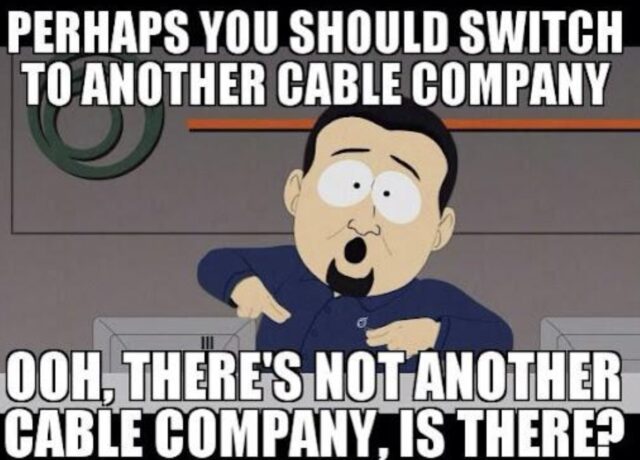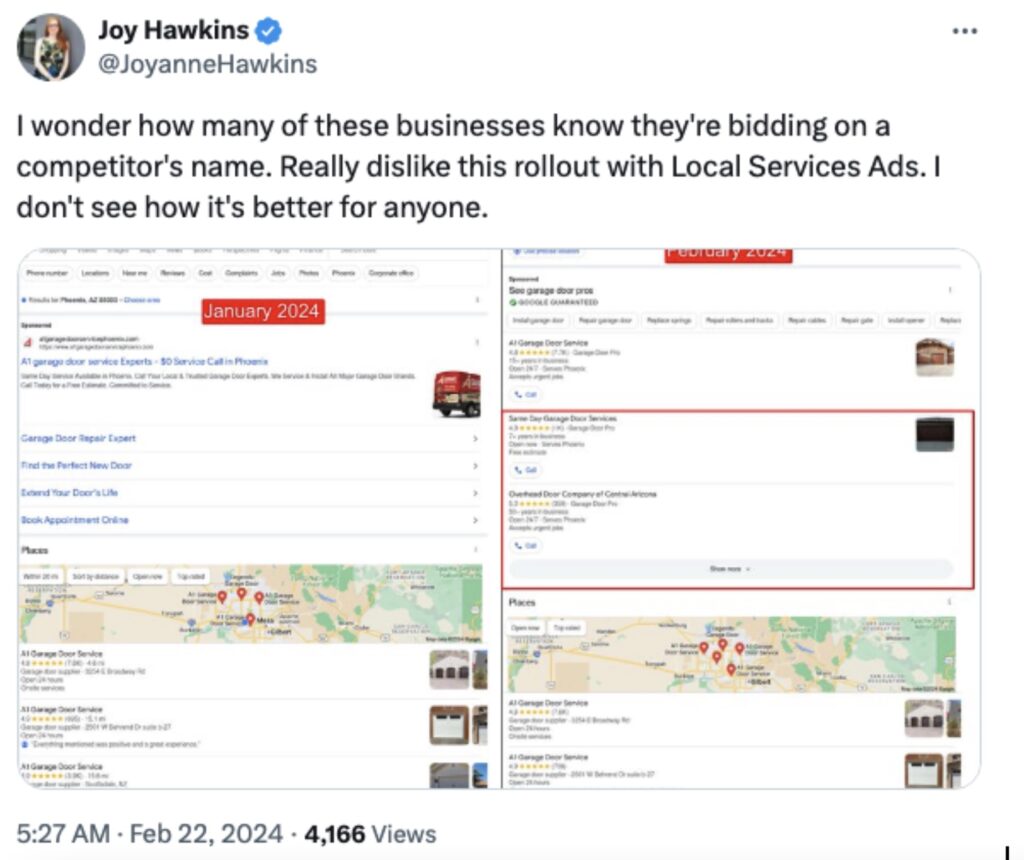Fuck Google
So let me start with… this isn’t my post. It was sent to me in response to some of the recent posts I’ve made about how Google has evolved both their PPC and more recently, their LSA tactics to deliberately squeeze more money out of advertisers without adding any more value and obfuscated those moves by limiting visibility into reporting. It’s a rage post that someone banged out and then (wisely?) decided not to post fearing retribution. I know the guy who wrote it, very well. We’ve spent countless hours over the years talking digital marketing and he and I both share a common path from Google Advocate to Apologist to… well, wherever we are now. He’s working in legal for the better part of a decade and currently is in-house at a multi-state PI firm overseeing a large, sophisticated online and offline marketing campaign.
And if you aren’t currently furious at Google… have a read because you aren’t really paying attention…
As a marketer, advertiser, and longtime Google apologist, it pains me to say this but fuck Google.
Over the past year, it’s become clear that Google doesn’t care about individual businesses advertising on their platform, and it’s increasingly looking like they barely care about providing decent results for people researching businesses in their city.
When Google quietly jettisoned “Don’t be Evil” back in 2018 that seemed like a bad sign. “Don’t be evil” feels like the kind of mantra that, once stated, can’t be removed without raising some eyebrows. It’s like having a sign next to your pet saying, “this dog doesn’t bite.” Once people notice the sign is gone it’s not unreasonable to wonder what prompted the removal. But whatever, Google still encouraged employees to, “do the right thing,” and barreled forward on their path to total internet domination.
With Google’s 80% market share necessitating a strong presence for any business looking to reach potential clients online, the relationship between local businesses and Google has always been somewhat contentious. It’s not surprising that many business owners have been frustrated with everything from shakeups in rankings, shady (but effective) tactics in local search, and a fallacious (but eerily persistent) impression that spending more in PPC increases prominence in organic search results.
I’ve frequently discounted most of these concerns with the following defenses of Google:
- Google is doing the best they can. – Policing and monitoring the internet is a herculean and losing task. Even if you’re making a legitimate effort it’s an unwinnable game of whack-a-mole. However, it’s in Google’s best interest to decipher what users are searching for and deliver a strong selection set for each query.
- Google relies on searchers finding the best result possible. – My premise has been that by ensuring high-quality results for users, Google can maintain their market position as long as possible. If results stop being useful, seeking out competing alternatives becomes more likely. As a result, it benefits Google to develop and continuously refine some criteria of what constitutes a good business and place those companies more prominently in front of potential customers.
- Google can’t be expected to care about any individual business and devotes focus to entire industries. – Evaluating each individual business is impossible, but having industry specific criteria is slightly more manageable. Google can’t reasonably assess every business in a category, but they can define what’s important to potential customers. If your business isn’t showing up for a specific intent-based search, my Google sided explanation would be that it’s because you’re not what Google thinks that searcher is looking for. It’s not nefarious, it’s just Google looking at a much bigger picture than just your business.

Enter Local Service Ads and a whole new corrupt ecosystem.
Unlike the PPC days where ads were ads and a reasonable percentage of searchers understood the distinction, Local Service Ads have increasingly (and I’d argue deliberately) muddied the waters.
Having already optimized PPC ads to mitigate ad blindness, Google has been finding new and creative ways to effectively monetize searches with high intent. This isn’t inherently a bad thing, especially when it provides businesses with a way to compete for the attention of a potential customer in the market for their services.
Local Service Ads were launched in 2015, but didn’t really take off until 2018-2019 as industry categories continued to expand. These ads, unlike traditional PPC, imparted a soft-endorsement from Google by listing the advertised business as “Google Screened” and bestowing them with a snazzy checkmark.
The original intent seemed to be sound. The idea of “Google Screened” was presented as a way to ensure searchers looking to hire a local business, specifically in industries where a contractor would be visiting their home (think plumbers, locksmiths, electricians, etc.), could know with certainty that anyone from that business performing house calls had undergone a background check and was “Google Screened.”
Over time, categories expanded and the product morphed into a pay-per-call version of Google Ads, where high intent searches frequently delivered Local Service Ads at the top of the results and approximately 1 in 3 searchers engaged with LSAs instead of the local map pack or traditional organic results. With LSAs becoming one of the most effective ways for local businesses to get in front of potential customers, competition quickly increased.

Fast forward to 2024 and businesses are more reliant than ever on utilizing some form of Google advertising to reach potential clients. Shockingly, as more businesses rely on their platform, Google’s customer support has dropped to an “all-time low.”
Google has officially turned into Comcast from a decade ago. Congratulations!
All of this would be annoying for local advertisers if it wasn’t for Google’s most recent, and most insidious, update to their Local Service Ads platform: the addition of “Branded Local Service Ads.”
A few months ago, Google added a “Direct Business Search” feature within each LSA account. This setting defaulted to “on”, and was pitched as a way to, “Let Local Services Ads highlight your business in results when someone searches for your brand or business directly.”
As someone that has defended the value of bidding on your own brand in the PPC space, this felt like an obnoxious extension of that same idea. But the devil is in the details, and the total lack of transparency surrounding what is and is not a branded search has been frustrating at best and deliberately misleading at worst.
Given Google’s dominance in the search space, the only way to steer clear of the auction-based, client-to-the-highest-bidder model has been to aggressively brand your business using other forms of advertising. If people are searching for your business by name, Google has historically showed your result prominently. As it should.
Now, with the implementation of LSAs for branded searches, Google is attempting to squeeze more revenue from local businesses while providing no benefit to the consumer. It’s hard to defend a duplicate listing placed directly above a business’ organic listing as having any real value to the searcher.
Making things worse, there is zero transparency provided when someone does call from your “direct search” LSA ad. Despite a “job type” tag built into the dashboard, Google does nothing to denote what calls are from branded searches vs. category specific searches. This makes it impossible to separate acquisition costs like you would with a traditional PPC campaign and artificially lowers your acquisition cost in the aggregate. After all, most companies are better at converting people who already know they want to work with them than the ones who are shopping for the best fit.
Additionally, because there’s no insight into the cost for any given call, you have absolutely no idea what Google is charging you to place your own ad atop your own business that you’ve already spent money branding to the general public. Obviously, you can turn the ads off and refuse to participate in Google’s shameless cash grab. But, there’s no guarantee Google won’t show ads from competing businesses within your own branded searches. Barry Schwartz posted about Google showing competitor ads within individual GBP listings back in March. Weeks earlier, Joy Hawkins of Sterling Sky had posted about the same issue occurring for the branded search “A1 Garage Door Service.” A Google Ads Liaison Officer responded to the post, saying, “This is a bug (and it was thought to be a non-brand query) – a fix is underway.” Yes, accidents happen. But preventable accidents occurring solely because of a greedy and unnecessary product rollout are significantly less forgivable than a well-intentioned mistake. Even if this bug has indeed been fixed for certain branded terms, it’s going to remain fuzzy for brand specific searches in industries where the business name often contains the service category.

In a vacuum, the rollout of this ad type would be annoying. Coupled with Google’s push toward trusting their algorithm, letting them adjust your bidding strategy to “maximize conversions”, removing any clarity around what you’re paying for individual lead types, and eliminating any meaningful level of customer service for businesses spending well into six-figures per month, it’s hard not to think this is at least evil adjacent.
Sure, Google could “do the right thing” and sacrifice some potential revenue by not plowing ahead with a redundant ad type that confuses searchers while bilking businesses in a way that deliberately obfuscates the price being paid. However, it’s increasingly feeling like Google’s idea of doing the right thing means holding onto their massive profit margins regardless of how that money is acquired.
With over 80% of the global search market, Google knows you need them a lot more than they need you. It’s not going to get better, and even though I’d already resigned myself a while ago that we were all racing to a break even for digital leads while Google laughingly lined their pockets; paying a premium for people who already want to call to do so via a duplicative “Google Screened” button was a surprisingly obnoxious twist.
Each greedy new feature Google rolls out adds to the prisoner’s dilemma facing online advertisers. We all know it’s an unwinnable game, and there are way too many business owners for collaborative defiance. But, the fact that there’s no other game we can play should scare all of us.
So, quietly and with no byline, I’ll say again, fuck Google! Fuck them so much I’m turning off this one feature and begrudgingly continuing all other Google Ads. They’re going to feel this one when their next earnings report comes out!
